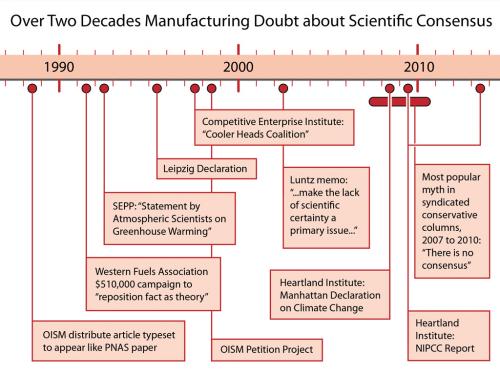
The importance of public perception of scientific consensus has been established in a number of studies (e.g., here, here and here). Perhaps nothing underscores its importance more than the strenuous efforts that opponents of climate action have exerted in attacking consensus. For over two decades, fossil fuel interests and right-wing ideologues have sought to cast doubt on the consensus:
Consequently, it comes as no surprise that our paper Quantifying the consensus on anthropogenic global warming in the scientific literature has come under intense attack. Since published 6 months ago, nearly 200 articles have been published online attacking our paper. The attacks have come in the form of blog posts, Youtube videos, cartoons, papers, reports and conspiracy theories. The most entertaining conspiracy theories are Christopher Monckton's suggestion that the high-impact journal Environmental Research Letters was created for the purpose of publishing our paper and Anthony Watts' accusation that Dana Nuccitelli has vested interests in oil.
Attacks on any scientific consensus, whether it be human-caused global warming or the link between smoking and cancer, exhibit five characteristics of science denial. Similarly, the attacks against our paper have exhibited the same five characteristics. Some of these characteristics are on offer in an opinion piece by Anthony Cox published in the Newcastle Herald. I was granted the opportunity to publish a response in the Newcastle Herald, which was published today:
I point out that just as there are many lines of evidence for human-caused global warming, there are similarly a number of independent indicators of an overwhelming consensus among climate scientists. This replication is found even within our paper, which finds a 97% consensus whether rating the abstracts of each paper or inviting scientists to rate their own papers:
As the evidence piled up, overwhelming agreement developed among climate scientists. A 2009 survey of Earth scientists found that among actively researching climate scientists, more than 97 per cent agreed that humans were changing global temperatures. A 2010 study found that among climate scientists who had published peer-reviewed climate research, there was 97-98 per cent consensus.
I was part of a team that examined 21 years of climate research, identifying all papers stating a position on human-caused global warming. Some papers explicitly said humans were causing global warming. Others were more specific, quantifying just how much of global warming was caused by humans. Among papers giving a position on the topic, 97.1 per cent agreed humans were causing global warming.
Replication is the heart of scientific research. We checked our results by asking the actual scientists who authored the climate papers to rate their own research. As a result 1200 scientists rated their own papers. Among papers self-rated as stating a position on human-caused global warming, 97.2 per cent endorsed the consensus.
If there is a consilience of evidence and overwhelming agreement among climate scientists, how does one cast doubt on the consensus? By employing the 5 characteristics of denial, tactics honed by the tobacco industry in the 1970s and now adopted by climate deniers:
Consensus matters. When people correctly perceive that scientists agree about climate change, they're more likely to support climate action. Consequently, those who oppose policy to mitigate climate change have sought to cast doubt on the consensus for over two decades.
This is done with the same techniques of the tobacco industry and right-wing ideologues who denied smoking causes cancer.
Fake experts are invoked to portray the impression of ongoing scientific debate. Evidence is cherry-picked and any inconvenient data is ignored. Just as the tobacco industry demanded unreasonable levels of proof that smoking caused cancer, opponents of climate action employ the same technique of unrealistic expectations.
The same tactics are on offer in Anthony Cox's opinion piece "Politics muddy global warming debate" (Herald 27/11). Mr Cox magics away the overwhelming scientific consensus via "unrealistic expectations". He ignores any paper that doesn't specify the percentage of global warming humans have caused.
Thousands of papers endorsing the consensus conveniently disappear. Statements such as "global warming caused by greenhouse gases emitted into the air is a result of the human activities" or "accumulating evidence points to an anthropogenic 'fingerprint' on the global climate change that has occurred in the last century" do not endorse the consensus, according to Mr Cox.
Our understanding of climate change is based on many lines of evidence. The result is an overwhelming scientific consensus, observed in a number of independent studies.
However, those who reject climate science persistently muddy the waters in the same manner right-wing ideologues and the tobacco industry denied the science linking smoking with cancer.
Posted by John Cook on Thursday, 28 November, 2013
 |
The Skeptical Science website by Skeptical Science is licensed under a Creative Commons Attribution 3.0 Unported License. |